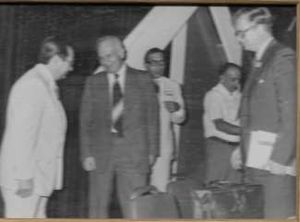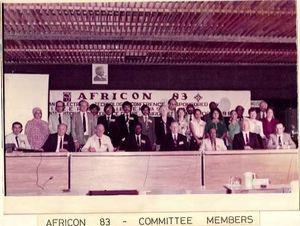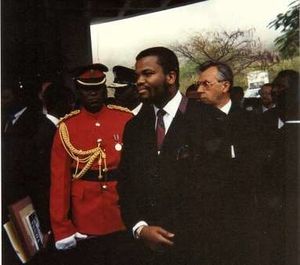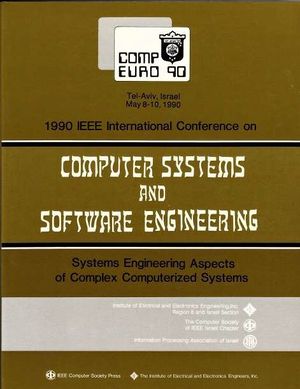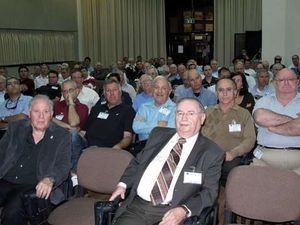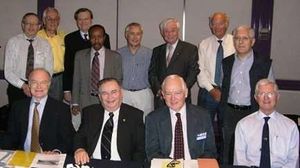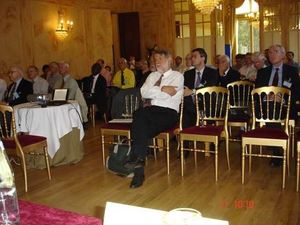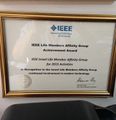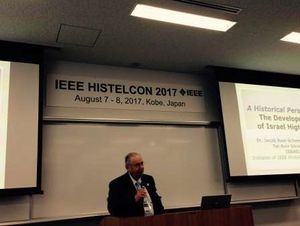First-Hand:My Life with IEEE
By Jacob Baal-Schem, Senior Life Member
Chair of IEEE Israel Section
While leaving my office on the September 1977 day of my retirement from over 30 years of military service, I was met by Gurion Meltzer, a Past-Chair of the IEEE Israel Section who congratulated me. At my surprise he announced that as of this moment I become Chair of the IEEE Section. Asking for formalities, he said that I was the only candidate and therefore there was no need for a vote and the IEEE Israel Committee has elected me as its Chair. I am not sure if this was exactly according to the bylaws, but from this moment I became Chair of the First Section of IEEE in the Eastern Hemisphere, founded in 1954 as an IRE Section.
My IEEE Membership began a few years before. I joined IEEE as a graduate student, due to the advice of Yeshayahu Lavie, a former Chief Signal Officer of the IDF, who was actually my carrier tutor when he convinced me to get to study Electrical Engineering at the Technion in Haifa(back in 1954) and encouraged me to continue my studies for M.Sc. and later for my Doctor in Science Degree, while I continued to serve until the rank of Colonel, in the Israel Defence Forces Signal Corps and later – in the Defence Research and Development Dept.
In 1954, 30 IRE Members living in Israel sent a petition to form an IRE Section. Their request was approved and since October 1954 the IRE Israel Section existed. On January 1963, when IRE and AIEE merged, this section became the IEEE Israel Section, as part of IEEE Region 8.
In 1977, as far as I remember, the Section had about 400 members and several Chapters, including the Communications Chapter, which I founded and chaired. The Section held every second year a Technical Convention, which was highly respected and had a large audience, with the presence of the President of the State of Israel and Government Ministers. The official change of Section Chairs was held at the 1977 Convention when Mr. Weissenstern introduced me as New Chair, in presence of Israel President Ephraim Katzir and IEEE Region 8 Director, Prof. Folke Bolinder.
The administrative activities of the section were hold at the office of the Ortra Travel Agency, headed by Mr. Zvi Gelfand, and I spent some time there to learn the organizational and financial rules of IEEE and my duties as Section Chair. The Chapters were quite active and held technical meetings and I worked on getting a larger membership and on preparing the next Convention.
Mr. Guri Meltzer had told me about the EUROCON Conference held by Region 8 and EUREL (the association of European National EE Societies) and gave me his copy of the Proceedings. Having been impressed by his report, and after consulting my board members, I decided to request the holding of a next EUROCON in Israel. After corresponding with EUREL, I met its secretary – Mr. Gainsborough. I explained my proposal and his answer was: “What will we do if Mr. Arafat will also ask to hold a EUROCON?” and on this basis refused my request.
At this point I remembered the words of the Mayor of the city of Natanya, in Israel: “If you want to be Mayor of a city - go and create a city!”. If we cannot host EUROCON – let’s set-up a new IEEE Conference that can and will be hosted by the Israel Section. I prepared a document and presented to the Region 8 Committee my case of forming a “Mediterranean Electrotechnolgy Conference – MELECON”, which will rotate between the IEEE Sections surrounding the Mediterranean see. My proposal was approved as well as the holding of MELECON ’81 in Tel-Aviv, Israel. An agreement of financial partnership was signed between the Regional Director and the Israel Section and we received an advance for beginning to prepare the event.
MELECON 1981
The preparations for MELECON ’81 involved many activities. This was actually the first Conference in which IEEE Region 8 has the whole administrative and technical responsibility and therefore the Regional Directors – Dick Poortfliet and Prof. Walter Proebster were very much involved. The Israel Section and ORTRA Company spent all possible energy in getting the best results. We sent out an International Call for Papers and organized reviewers of the abstracts received. We contacted the offices of the President of Israel and of IEEE President to invite them to participate in the opening ceremony and reserved the Tel-Aviv Hilton, the largest Hotel in Tel-Aviv for the days of the Conference, who’s dates were set for May 25-27, 1981.
I received much help from my colleagues at the Region 8 Committee. Prof. Bilal from Egypt was like a brother to me and Prof. Protonotarius from Greece already announced his intention to hold the next MELECON.
A Medical problem harmed my excitement: During the preparations I suffered a heart attack and had to be hospitalized. Director Poortfliet came to visit me at the Hospital and on returning home, I got permission to fly to Rome for a Conference Committee meeting that I had to Chair (promising that I will not carry any suitcase and not leave the Hotel in Rome).
MELECON ’81, with over 1200 attendees, was a great success. The opening session hosted the President of Israel – Itzhak Navon and the President of IEEE – Dick Damon and included a Keynote Lecture by Prof. Yaakov Ziv (who’s Lempel-Ziv algorithm was recognized some years later as an IEEE Milestone). Many dignitaries honored this session, as the Mayor of Tel-Aviv. We had also a Lady guest from Egypt, who met with President Navon (who speaks fluent Arabic) and this appeared on the Television news in the evening. The gala Dinner was held on my Birthday and I was surprised by a cake prepared in my honor. At the end of the Dinner I hanses over the MELECON flag to Prof. Protonotarious, who would Chair MERLECON ’83, in Athens, Greece.
MELECON ’81 aws also very successful financially and I brought a check of 60,000 US Dollars to the next Region 8 Committee. Before the Committee meeting I received a phone call from Professor Proebster, who participated in the Conference, asking me to become the first Conference Coordinator of Region 8. I accepted and held this function for 13 years, until 1993. The income of MELECON ’81 served as basis for a Conference-fund of Region 8, who provided seed money to future Regional Conferences.
AFRICON
Walter Proebster, Region 8 Director 1981-1982, was very much interested in Conferences and, as Region 8 just included Africa in her borders, he opted to have an African Conference. The Kenya Section had a very energetic Chair – Patel, and he proposed to hold the first African Conference in Nairobi. The Regional Committee approved and the Conference was named AFRICON. We went to Nairobi to make the first arrangements at the proposed venue – Jomo Kenyatta Conference Center. Compared to the Tel-Aviv Hilton this was a bit disappointing, as the manager told us: “You get a blackboard in each room, but you have to bring the chalk by yourself”. I also was told to be aware of local problems: When I proposed that the Dean of the Nairobi Technical University should present the keynote speech, I was warned not to mention this, as the actual Dean was the of a “coup” against the President (About 15 years later, when I told this story to a group of participants at AFRICON in Stellenbosch a black person pointed to himself and said “that was me!”.
Another event which comes to my mind is as follow: The flight from Tel-Aviv arrived usually early in the morning and at one of my visits (I participated in all Organizing Committee meetings) on a Friday morning, the Section Secretary invited me - on behalf of the mother of the President of the Kenya Jewish community to a “Gefilte Fish” Sabbat Dinner.
AFRICON 1983 went well, with participation of IEEE President and Kenya Government representatives and we decided to hold an AFRICON every three years. This was quite difficult to realize in the beginning, as there were only few IEEE Sections in Africa and it was difficult to find a convenient venue.
Therefore the second AFRICON was held as a Seminar at the Hotel Ivoire in Ivoty Coast. Here we had some surprises: Our Treasurer, Karsten Drangeid arrived from Spain with an attaché case full of US Dollars, in order to pay for the meeting, but was arrested at the airport as he had no passport. Karsten was a Swiss citizen and had no idea that he needed a passport anywhere. Finally the whole group waited at the airport until he was released and arrived safely to the Hotel.
For the Third AFRICON, planned for September 1992, I suggested Swaziland, seeing in it a tribute to genuine African culture. We went to Mbabane by bus from Johannesburg and had some problems on crossing the border to Swaziland, but they were solved by the Dean of the Johannesburg University who chaired the Conference.
We had invited the King of Swaziland to open the Conference and he actually arrived on time, with many of his Ministers and gave a nice opening speech. Our Regional Director, Kurt Richter had brought a gift: a Solar operated street light and offered it to His Majesty and the whole ceremony was very colorful
I learned that African IEEE members preferred holding the Conferences in South Africa and the following three AFRICONs were held there: Africon ’96 in Stellenbosch, Africon ’99 in Cape Town and Africon 2002 in Pretoria. Following Conferences went to different countries in Africa.
COMPEURO
EUROCON, MELECON and AFRICON were planned and are “Horizontal” Conferences dealing with many technical fields: Communications, Circuits, Power etc. Prof. Proebster, who was a Computer specialist, thought that we should have in Europe a specialist’s event on Computer Sciences and – together with the IEEE Computer Society – we founded COMPEURO. Together with a representative of the Computer Society, we prepared a detailed manual and the first CompEuro was held in May 1987 in Hamburg, Germany.
It seems that Computer Engineers and Scientists preferred to present technical papers at Computer Society major Conferences and therefore the participation in CompEuro Conferences was low. The CompEuro series stopped after the 7th edition in Paris in 1993.
Conference Coordination
During my activity as Region 8 Conference Coordinator, from 1981 until 1994, I was strongly involved in the planning and especially in the budgeting of every event. I participated at least in one of the Organizing Committee meetings, to assist the members in scheduling and budgeting – as towards every Conference there was a new Committee.
At its meeting in Athens in May 1983, when I brought the check from MELECON ’81, the Regional Committee decided to constitute a Conference reserve to advance funds and receive surpluses to/from Regional Conferences and invested the Melecon 81 surplus as basis of this fund, which was administered by The Regional Director, Treasurer and Conference Coordinator. All Eurocons, Melecons. Africons and CompEuros received advance funding from this fund and had to return the amount plus the Region 8 part of their surplus to the fund. The problem was that some Conferences did not make surpluses and some even could not refund the advance.
At the Regional Committee meeting in London in October 1984 I presented a document on “Policy and Procedures for IEEE Region 8 Conferences”. The document was approved by the Committee and served as guide to all Conference activities, until the end of my term.
Twice during these years I run for Regional Director, but was defeated.
During 1993 and 1994 I was appointed member and Chair of the IEEE Regional Activities Board Conferences Committee.
Chapter Coordination
In 1988 I was appointed Region 8 Chapter Coordinator in addition to Conference Coordinator and fulfilled this position until 1996. I had founded the IEEE Israel Communication Chapter and was active in forming additional ComSoc Chapters in the Region and tried to bring this experience to other Societies. I was also in contact with ComSoc Chapter coordinator, Celia Desmond, who later became ComSoc President. I organized the first Communication Chapters Chairs meeting in Region 8 to discuss Chapter activities. ComSoc continued this activity and organized several CCC meetings, to which I was invited as presenter.
The Larry K. Wilson Award
My Regional activities brought me to many IEEE events. In 1984 I had the pleasure to participate in the IEEE Centennial Meeting in Boston, which was actually the first IEEE Sections Congress and I also received the IEEE Centennial Medal.
In 1987 I was awarded the Larry K. Wilson Transnational Award “For initiation, Guidance and Enhancement of the MELECON series of Conferences”. The Ceremony took place at the Four Seasons Hotel in Munich and was followed by a nice reception. The Israel Section organized a special event in my honor to celebrate the award.
In year 2000 I received the IEEE Millennium Medal, representing the Israel Section.
Region 8 Committee
When I participated in my first Regional Committee meeting in Madrid in December 1977, I believe that we had less than 10 participants. The Committee membership was very “familiar” and we had the opportunity to meet between meetings and even to be invited to stay with other members (e.g. Bob Winton and his wife) for some days. My wife and I still keep contact with some of the actual ands past members and enjoy their company during meetings and trips, especially in the UK, Germany and Austria.
IEEE Technical Activities Board
In 1994 I was appointed member of the IEEE technical Activities Board Conferences Committee (later named Meetings Committee) with L. Terman as Chair and developed several activities there. We changed the Conferences Manual to the transnational views of IEEE and I suggested the forming and chaired the Conferences Development sub- committee which dealt with many problems related to international conferences, as providing information by societies to sections, etc.
Actually this was a very interesting part of my IEEE HQ activities and I had the occasion to work with many interesting people. After ending my term in 1996 I presented my candidature for Chair of this Committee, but was defeated.
Conference organization Seminars
As part of my IEEE/TAB Technical Meetings Development Committee activities, I organized and held three “IEEE Conference Seminars”, in Acapulco, Mexico (23-25 July 1996) for Region 9,. Singapore for Region 10, and Ljubljana (19-20 September 2003) for Region 8. The purpose of these seminars was to assist local officers in bringing more IEEE Conferences to the Region, by provide guidance in procedures and planning.
Relations with IEEE Presidents
During my years of activity, especially as I joined HQ Committees, I had the opportunity to make contact with many of IEEE Presidents.
During my Sabbaticals from Tel-Aviv University at MIT in Boston, I made a good contact with Dick Damon, who lived nearby. We met several times, visited together meetings of the Boston Section and my wife and I were invited to his home.
Many of IEEE Presidents and ComSoc Presidents visited Israel and my wife and I had the pleasure to host them at a Dinner in our home in Herzlia. Among all I remember Chuck Alexander and his wife, the Eisensteins, Joel Snyder, Michael Lightner, Art Winston, Leo Young and especially Cleo Anderson whom I accompanied on his very emotional visit to Jerusalem.
Chuck Anderson fought very hard to nominate me as member of the IEEE N&A Committee and Arthur Stern assisted me later in my activities in the History Committee.
Activities in Russia
During the 1987 celebration of the Wilson Award, I met with Yuri Gulyaev, Chair of the Russia Section (later becoming the Moscow Section). He was very friendly, but could not invite an Israeli to Moscow (the USSR) and told us about his Jewish wife who would like to visit Israel. Unfortunately she passed away some time later without doing this visit.
As the Berlin wall fell and Russia opened its borders, my wife and I were invited to visit the IEEE Russia Section. We then met Henrich Lantsberg, vice Chair of the Section and his family.
The main aim of the visit was to set-up a Communication Chapter of the Russia Section. We visited many laboratories and spent also some time to see the Kremlin, Museums and the sacred site of the Russian religion. Finally I met with 12 eminent scientists in Electronics and they signed the petition for forming the Chapter. At the same occasion I became Honorary Member of the Russian Popov Society of Electrical Engineers.
On our second visit to Russia, my wife and I went also to St. Petersburg by train and were received by the Chair of the Engineering Society and lodged at a residence belonging to the Russian Academy of Sciences, near the Hermitage Museum.
At another visit we begun organizing a Seminar on Communications Systems and Software, supported by the IEEE ComSoc. Here I was strongly assisted by Dr. Alex Gelman, a Bell Company Scientist who was born and educated in Russia and spoke Russian, who served as Treasurer of the Seminar and also by Steve Weinstein of ComSoc who acted as Program Chair.
The Seminar actually awaked the real IEEE activity in Russia. We met people from St. Petersburg, who later formed the basis for the St. Petersburg Section. Similarly we met people from Siberia whom we found later as active members of IEEE.
Conference on Engineering Education
In 1977 I brought up an idea to organize a Conference on Engineering Education. Professor Arthur (Art) Winton, IEE VP Educational Activities accepted to co-chair and we received financial support from the United Engineering Foundation in New York. The “Interdisciplinary Conference on Electrical, Electronics & Computer Engineering Education in the Third Millennium” took place in Davos, Switzerland, on 10-15 September 2000, with the participation of 55 attendees, including IEEE President Dr. Bruce Eisenstein and Dr. Joseph Bordogna, Deputy Director of U.S. National Science Foundation and later – President of IEEE.
IEEE Life Members activities
In 2002 I became IEEE Senior Life Member and initiated a petition for forming an IEEE Israel Life Members Affinity Group, which I chair since. As this was the first LM Group in Region 8 I was appointed Life Member activities coordinator of Region 8 and served in this position from 2003 to 2006, again from 2008 to 2010 and again in 2013-2014. I managed to form LM Groups in UKRI, France, Slovenia, Croatia and Switzerland. In 2003 I was appointed member of the IEEE Life Member Committee until 2006 and again reappointed for the 2013-2014 term.
In Israel, I convinced the Managing Committee of the Association for the fallen of the Signal corps to enable me to use the Conference Hall of its site to organize technical meetings and the editor of “The people” – a journal on Technical subjects to advertise and make registration for a series of “Technical Fridays” sponsored by the IEEE Life Members Group. We held 3 of these meetings in 2009, each getting about 200 attendees – IEEE LMs and members as well as non-members from the engineering community. In 2010 the Israel National Engineering Society sponsored similar meeting on Tuesdays and until the end of 2014 we held together already 19 Technical meetings, each with 5-6 speakers, on a various line of subjects.
History activities
At the beginning of the Third Millennium as I became Life Member, I also turned my interest into History subjects – History of Electrotechnology in general as well as history of Region 8 and IEEE. I had the chance to meet Arthur Stern at the occasion of one his visits to Israel. He was Chair of the IEEE History Committee 2004-2006 and I told him that I would be interested to be active in this field. I also met Dick Gowen, History Committee Chair 2007-2009 and he invited me to a meeting aimed to discuss the future of the IEEE History Center.
In Region 8 I convened a group of officers interested in History activities to a luncheon where we discussed how to act and we formed a “History advisory committee” as well as a Region 8 History network on the web.
Region 8 History activities team decided to set up a History network for IEEE members. By joining the History network you will receive periodically information on meetings, conferences and other activities related to the History of Electrical and Information technologies.
Major developments in electrical, electronics and computing technologies and applications have occurred in the area of Region 8 (Europe, Africa and the Middle East) and many IEEE Members still living have participated in these events. By interviewing these persons, collecting and archiving materials and making the materials available to researchers and to the general public, we can preserve this information and disseminate it to make society aware of the importance of technology, encourage students to consider technology as a career path and assist the well being of society by leading to further scientific and technological developments.
The group decided that History activities in Region 8 will be conducted by the following procedures:
- Coordination of Region 8 History activities by a R8 Committee member to be appointed by Region 8 Director.
- Guidance on activities by the History Advisory Council (HAC) consisting of experts and interested members approved by Section Chairs.
- Expertise in collecting and preserving information to be provided by IEEE History Center.
- Most activities to be performed by volunteers from IEEE Sections, with special emphasis on Life Members.
- The focal point for History activities in the Region will be the UKRI Life Member Group.
- A volunteer will serve as Webmaster for the web site (to be part of the R8 site)
- Funding will be provided from Region 8 budget, Section budgets and grants from supporting funds.
As an outcome of these activities, Region 8 decided to have a History activities Coordinator on the Regional Committee and I served in this position from 2008 to 2010. At the same time I was appointed member of the IEEE History Committee and served there from 2008 to 2012 five terms of interesting meetings and strong involvement, especially in conferences.
At the end of 2014 I was reappointed as Member of the IEEE History Committee for 2015.
IEEE Milestones
My interest in History brought me already in 2002 to learn about IEEE Milestones in Electrical and Computer Engineering and I prepared a proposal for a Milestone on the Lempel-Ziv Compression algorithm. The Technion authorities cooperated and finally the Milestone was dedicated in September 2004 at the entrance hall of the old building of the Technion in Haifa, in presence of Yaakov Ziv, IEEE President-elect Cleon Anderson and Technion President. We met at one of the original lecture rooms of the Technion and Yaakov Ziv presented a lecture on the algorithm. Sometime later, we organized a meeting with Abraham Lempel who was not able to attend the ceremony.
I prepared a new proposal on the WEIZAC, actually the first Digital Computer installed in Israel (1854). I was lucky to get in touch with Prof. Gerald Estrin, who actually built the computer, after getting the blessing of a Princeton Committee chaired by Albert Einstein, to copy the IAS machine designed by Von-Neuman. Estrin even accepted to cover the price of the plaque and the Weizmann Institute assisted with the arrangements. We had a meeting with the person who built the computer – Professor Aviezry Frenkel, who as a student worked on building the computer (without pay) and had a lecture by Prof. Shamir.
The unveiling took place on 5.12.2006 at the Weizmann Institute, in presence of IEEE President Lightner and Weizmannn Institute President Prof. Daniel Zajfman, at the building where the original computer is kept.
HISTELCON
As part of my History activities I initiated the holding of a HIiSTory of ELectroechnology CONference and named it HISTELCON. I had the backing of the Region 8 Director, Remy, and received approval of the Regional Committee to hold the event in Paris, France. Jean-Gabriel Remy proposed for Chairman Jean-Claude Boudenot, of Thales R&D. He agreed and begun working hard on organizing the event, but suddenly we learned that he had cancer and together with Remy, we decided that Boudenot and myself would co-chair the Conference, set for 11-12 September 2008 at the Cercle National des Armees in Paris. There was great interest on the Conference and we had about 60 participants from all around the world, despite the shortage of funding for Historians of Technology to get to Conferences. Boudenot chaired all the meetings and participated in the first day of the Conference before getting to the hospital. He even managed to print the Proceedings and to send them and two weeks after the Conference he passed away. He was a great man!
Histelcon was actually planned as a one-time Conference, but some months later I was approached by a colleague with a proposal to hold the next Histelcon in Madrid. A large Telecom Company provided great support and we had about 100 participants and a very good Conference.
Immediately after Madrid, the Italy Section proposed to have Histelcon 2012 in Pavia, where Volta had a laboratory and was teaching there. The University of Pavia had built a Museum of Electrical Engineering and the Director of this Museum, Antonio Savini, chaired the event, held on 5-9 September 2012. I managed to convince the IEEE History Committee and the History Center to co-sponsor this Conference instead of holding a separate Conference and the entire History Committee held its meeting in Milan and its members participated in HISTELCON at Pavia.
After the Pavia Conference, I came to the Region 8 Committee with a proposal to hold the next HISTELCON in Israel. The proposal was accepted and I brought it also to the History Committee and the History Center, in order to have their support. Mike Geselowitz, the Head of the History Center, accepted to serve as TPC Chair. At that phase, we learned that ICOHTEC – the International Committee on History of Technology – planned to hold their Conference in Israel in 2005. Their Conference has about 120-150 attendees and if we could join together, we could have a very nice event. I consulted the Region 8 Committee and they approved moving the next HISTELCON to 2015 and hold it in Israel, where we were able to get support from Tel-Aviv University in Lecture Halls as well as accommodation in times where there are no studies and many students are out of the dormitories.
HISTELCON 2015, the HISTory of ELectrotechnology CONference of IEEE Region 8, was held at Tel-Aviv University, Israel, on 16-20 August 2015. The Conference was organized by IEEE Israel Section in conjunction with the 42th Annual Meeting of ICOHTEC (International Committee on History of Technology) and with Technical Cooperation of IEEE History Center, represented at the event by Dr. Michael Geselowitz and Dr. John Vardalas. Region 8 was represented by its Director – Costas Stasopoulos and its Past-Director – Martin Bastiaans. The IEEE organizers were: J. Baal-Schem (Chair), Shmuel Auster (Vice Chair), Rafi Hoyda (Secretary) and past IEEE Israel Chair – Prof. Simon Litsyn.
The IEEE sessions dealt with Regional Studies – from Hi-Tec weapons of ancient European seas, the first Metro line in Budapest to Siberian Electronic Progress and Japan Innovation history. They were followed by presentations on Soviet Radio invention and Broadcasting and the history of Bell Labs and other facets of the history of electro-technology.
The last day was organized by IEEE Israel Life Members to celebrate 60 years of Israel High-Tech. Two morning sessions dealt with Israel Technological Development during the 60 years. After an overview of the roots of Israel Technology by Baal-Schem, Dr. Leviathan introduced the first Electronic Computer in the Middle East – the WEIZAC, one of the IEEE Milestones. Professor Nemirovski brought back to the first steps in Microelectronics and Dr. Shapira escorted through the steps towards Electro-Magnetic Compatibility.
Elisha Yanay described the setting up of Motorola Israel as an industrial pioneer and Daniel Rosenne introduced the problems encountered in using modern technologies in designing a military project.
Two Professors of Tel-Aviv University – Yosi Shaham and past IEEE Section Chair Simon Litsyn - introduced some of the more recent Israel technological achievements: Nanotechnology and Flash memories. Just by listening to the dimensions they use, one could see how far Israel High-Tech has moved since the first digital computer and the first microelectronic circuits. We still have to add the important theoretical researches, as the Lempel-Ziv theorem, which has also been recognized as an IEEE Milestone.
These tremendous achievements have been reached through the vision and the efforts of scientists, engineers, technicians and industrialists who founded and developed Israel High-Tech activities. Many of them – possibly most – are IEEE Fellows and Members. Some of the most eminent of them were with us, to celebrate 60 years of striving for excellence.
The third session was dedicated to a Homage to Israel High-Tech founders: Uzia Galil – founder of Elron; Benny Landa (Founder of Indigo), Yehuda and Zohar Zisapel (Founders of the RAD Group); Dov Moran (Inventor of the Disk-on-key); Gil Schwed (Inventor of the firewall and Founder of Check Point); Orna Berry ( Corporate Vice President Growth and Innovation EMC); Yossi Matias ( Vice President, Engineering at Google) and Moshe Yanai (Executive Chairman IBM XIV Storage System) who could not be present at the event.
The Founders received from Region 8 Director a Certificate of Appreciation signed by IEEE President and each of them was invited to present shortly "his way" to his achievements. All of them mentioned the special spirit of Israeli Human capital – a spirit of entrepreneurship and daring. Uzi Galil – who is recognized as the "Father of Israel High-Tech" claimed the actual generation is better than ours and we have to appreciate their capabilities and assist them in "their way" to future achievements.
The Conference ended at a Cocktail party, offered by IEEE Israel Section, in the premises of Tel-Aviv University. Next Histelcon is planned to be held in Kobe, Japan and its Chair , Prof. Isao Shirakawa, was present at Histelcon 2015 and received assurance of assistance from Region 8 and from former organizers of Histelcon Conferences, towards the possibility of getting HISTELCON to become an All-IEEE Conference on the History of Electrotechnology.
History and Life Members activities
During my 5 years membership on the IEEE History Committee (2008-2012) I brought-up several times the idea of joint activities with Life Members in different ways. From my activities in Israel I learned that interaction between young people (e.g. students) and experience persons (e.g. retired engineers) brings usually a win-win situation, as the young persons learn about events from the past from eminent persons who participated in these developments and the veterans are happy to discuss their former experience. I strongly believe that by forming teams of IEEE Students guided by IEEE LMs we can get good papers on Historical developments in Technology that happened during the last century.
In 2016 the IEEE Israel Life Members Affinity Group was awarded the IEEE Life Members Affinity Group Achievements Award for 2015 Activities "In recognition to the Israel Life Members Affinity Group involvement in modern technology. The Section received the award sum of $1000 and- in addition, I was invited as Chair of the Group to receive the Award document at the Region 8 Committee meeting in Porto, Portugal.
HISTELCON 2017
- IEEE HISTELCON 2017
- August 7 (Mon) - 8 (Tue), 2017
- University of Hyogo, Kobe Campus
- 7-1-28, Minatojima-minamimachi, Chuo-ku, Kobe, Japan
The Japan IEEE Council History Committee organized HISTELCON 2017 in Kobe. I participated as member of the Organizing Committee and as Invited Lecturer. Upon arrival to Kobe I participated in the VIP Dinner – a Tepan Yaki dinner at the Tajima restaurant. The host was Prof.Isao Shirakawa, General Chair of the Conference and I was pleased tha the Chair of the IEEE History Committee came to this event, as I believe that the History Committee should be more involved in the HISTELCON Conferences. The Conference had about 90 participants from Japam. USA (with Mike Geselowitz, Director of the Hisry Center), Australia, Vietnam, Korea, Russia and Bulgaria. My presentation dealt with the development of Israel High Tech.
At the Conference Banquet I was invited to announce the preparations for the next issue of HISTELCON – to be held in August-September 2019 probably in Glascow, Scotland.
Biography
Dr. Baal-Schem received the degrees of Bachelor of Electrical Engineering (1959), Master of EE (1966) and Doctor of Science in Industrial Management (1979) from the Technion, Israel Institute of Technology. After going through the ranks of Israel Defense Forces, he served as Head of the Technical Division of Israel Signal Corps (1973-1975) and Head of Electronics Division of Israel Defense R&D (1975-1977). He retired as Colonel, to join the Interdisciplinary Center for Technological Analysis and Forecasting at Tel-Aviv University (1978-1992). From 1992 to 1997 he was Head of the Interactive Telecommunications Program at the School of Communications of the College of Management and Senior Lecturer at Tel-Aviv University. He is Senior Life Member of IEEE, Member of World Future Society, and received the IEEE Centennial Medal in 1984. In 1987 he received the Larry K. Wilson Transnational Award for Initiation of the MELECON Conferences. In 2000 he received the IEEE Third Millenium Medal. He received the IEEE Region 8 Volunteer award for 2010.As Chair of the IEEE Israel Life Members Affinity Group he received in 2016 the IEEE Life Members Affinity Group Achievement Award fot 2015 activities.
He is married (since 1957) to Shoshana and has one daughter (Zehavit) and two grandchildren (Noa and Jonathan). He enjoys Classical Music and Traveling.
IEEE Activities
Committees/Boards
Admission and Advancement, 1994-95; RAB Regional Conferences, 1993-94; TAB Technical Meetings, 1994-96; TAB Technical Meetings Develop, 1995-96. IEEE Life Members Committee (2003-2006) ;History Committee 2008-2012
Regions
Region 8: Conference Committee, Chairman, 1987-94; Conference Coordinator, 1981-94;Chapter Coordination, 1988-96; Member of Conference Committee Reg. 8 (1994-200l);Region 8 Life Members Coordinator – 2003-2006; Region 8 History Activities Coordinator (2007). LM & History activities coordinator (2008- 2010).Region 8 N&A Committee (2015-2016)
Sections/Chapters
Israel: Chairman, 1978-81; Vice Chairman, 1981-1982; Communications Society Chapter,Chairman, 1978-82; Chairman. Life Member Chapter (2002-actual); Section Comptroller(actual)
Societies
Communications Society: EAME Region Board 2000-2003; EAME Region Council 2008-2012;ComSoc History Committee 2008-2012 (organizer of Globecom History Sessions in 2008, 2009 & 2010).
Conferences
AFRICON, Steering Committee, 1983, 1987, 1992, 1996; COMPEURO, Steering Committee, 1990; EUROCON, Steering Committee, 1982, 1988; ICC, Steering Committee, 1993, Education Symposium Co-Chair - 1999 MELECON: Chairman, 1981; Steering Committee, 1983, 1985, 1987, 1989, 1991, 1994, 1996; ICME Steering Committee 2000-2003; Globecom 2008 TPC ;Globecom 2009- TPC HISTELCON 2008- Co-Chair ;HISTELCON 2010 – Steering Committee; HISTELCON 2012 – Steering Committee and TPC; HISTELCON 2015 – Co- Chair, HISTELCON 2017 – Organizing Committee member, HISTELCON 2019 – Organizing Committee member.
